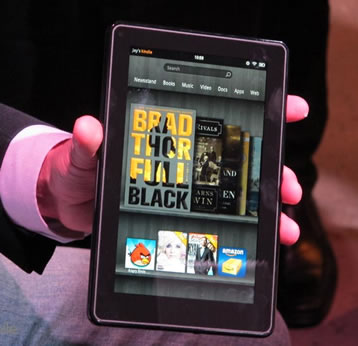Last Wednesday we covered Amazon new Kindle's launch event and that meant confirming many of the rumors that had been circulating about a potential Android-based tablet coming from the e-commerce giant, as well as learning what makes the Kindle Fire so special in a market already inundated with different flavors of essentially the same thing.
The $199 price point was a great place to start considering how the HP TouchPad's sales went from nothing to completely sold out in a single day after its dramatic price drop. You might recall how everyone was enthused about the iPad's $500 asking price a year and a half ago, but until recently no one had been able to challenge that without larger compromises. When the first iPad was out, you compared buying a tablet to buying a new laptop, so $500 seemed like a steal. But today any tablet has to compete with the iPad's $500 lowest price of admission.
The Kindle Fire shares a lot of its hardware specs with the BlackBerry PlayBook, a tablet that wasn't very well received mostly because of its software limitations. Thus, the hardware itself is not groundbreaking but is certainly capable of driving the Android OS. The Kindle Fire features a 7-inch 1024x600 pixel IPS display, a dual-core ARM processor and runs a customized version of Android Gingerbread.
The entire user experience has been rebuilt by Amazon and the tablet features full integration with various Amazon services including Prime video streaming, Music, the Kindle bookstore, their own Appstore (not Google's Android Market) and even Amazon's EC2 cloud hosting, as it powers part of the browsing experience in Amazon's Silk web browser.
Our friends at MobileBurn traveled to New York for the launch event,
here's a brief video showing the tablet in action.
Amazon is consolidating its web services around the hardware device, not unlike what Apple has done building an ecosystem, and once again something other third parties have had a great deal of trouble replicating, even Google. Amazon's bet on the new Kindle tablet is serious enough that they are willing to take a loss on each unit sold, but with over 100,000 Kindle Fire tablets sold in less than a week, I doubt they will have a problem making up for that.
People seem to be divided on whether the Kindle Fire will be a true iPad challenger or not. There are good arguments on both sides. On the negative I agree with the lack of productivity apps (though that's easy to remedy) and the inherent limitation of a 7-inch screen. But on the positive, it comes down to the services and the ecosystem, the millions of loyal Amazon shoppers, and the potential of disrupting the tablet market not because of a single device but because of Amazon's take on computing.
